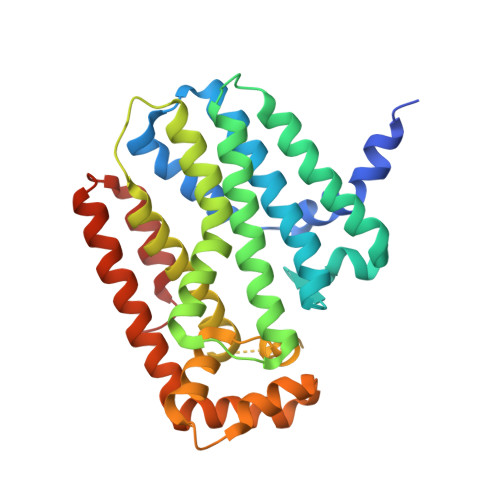Reduced Activity of Geranylgeranyl Diphosphate Synthase Mutant Is Involved in Bisphosphonate-Induced Atypical Fractures.
Lisnyansky, M., Kapelushnik, N., Ben-Bassat, A., Marom, M., Loewenstein, A., Khananshvili, D., Giladi, M., Haitin, Y.(2018) Mol Pharmacol 94: 1391-1400
- PubMed: 30275041
- DOI: https://doi.org/10.1124/mol.118.113670
- Primary Citation of Related Structures:
6G31, 6G32 - PubMed Abstract:
Bisphosphonates are widely used for treating osteoporosis, a common disorder in which bone strength is reduced, increasing the risk for fractures. Rarely, bisphosphonates can paradoxically lead to atypical fractures occurring spontaneously or with trivial trauma. Recently, a novel missense mutation (D188Y) in the GGPS1 gene, encoding for geranylgeranyl diphosphate synthase (GGPPS), was associated with bisphosphonate-induced atypical fractures. However, the molecular basis for GGPPS involvement in this devastating condition remains elusive. Here, we show that while maintaining an overall unperturbed global enzyme structure, the D188Y mutation leads to ∼4-fold catalytic activity decrease. Furthermore, GGPPS-D188Y is unable to support cross-species complementation, highlighting the functional significance of the reduced catalytic activity observed in vitro. We next determined the crystal structure of apo-GGPPS-D188Y, revealing that while Y188 does not alter the protein fold, its bulky side chain sterically interferes with substrate binding. In agreement, we show that GGPPS-D188Y exhibits ∼3-fold reduction in the binding affinity of zoledronate, a commonly used bisphosphonate. However, inhibition of the mutated enzyme by zoledronate, in pharmacologically relevant concentrations, is maintained. Finally, we determined the crystal structure of zoledronate-bound GGPPS-D188Y, revealing large ligand-induced binding pocket rearrangements, revising the previous model for GGPPS-bisphosphonate interactions. In conclusion, we propose that among heterozygotes residual GGPPS activity is sufficient to support physiologic cellular function, concealing any pathologic phenotype. However, under bisphosphonate treatment, GGPPS activity is reduced below a crucial threshold for osteoclast function, leading to impaired bone remodeling and increased susceptibility to atypical fractures.
Organizational Affiliation:
Department of Physiology and Pharmacology (M.L., A.B.-B., M.M., D.K., M.G., Y.H.), Sackler Faculty of Medicine (N.K., A.L.), Tel Aviv University, Tel Aviv, Israel; and Division of Ophthalmology (A.L.), Tel Aviv Sourasky Medical Center (M.G.), Tel Aviv, Israel.
















